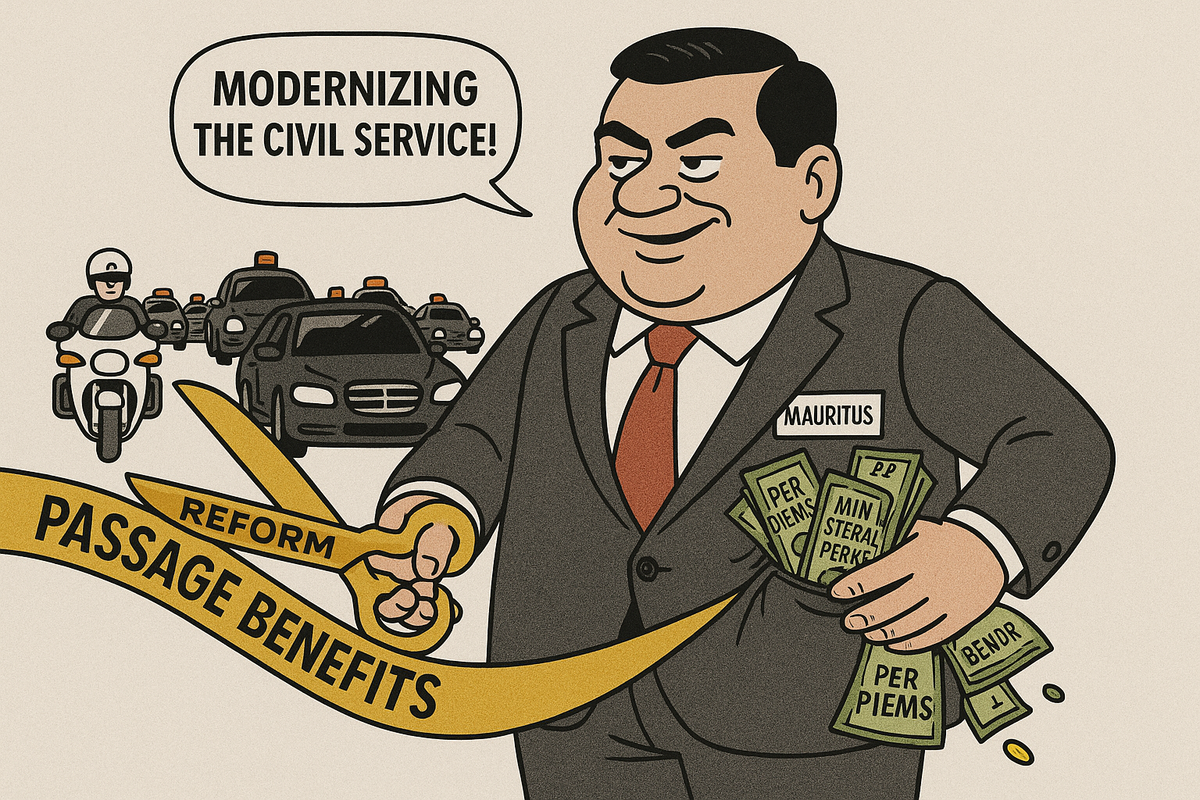Passage to Nowhere

Let us begin with a simple truth. In Mauritius the state has long doubled as a travel agent. For decades a quiet corner of the public payroll has functioned like a savings club with wings. Each year about five percent of a civil servant's salary turned into passage credit, a polite term for money that could later buy air tickets, pay exam fees, fund a medical trip, or finance a short hotel stay and a few bags of cement. Use it after five years, or let it snowball until retirement and cash it with the rest of the nest egg.
The origin story is colonial, as so many island curios are. In 1960, when a government tried to cut the perk, white collar staff answered with a strike that would make present day union leaders blush. The policy survived, ministers changed, flags changed, audit reports gathered dust, and the passage perk sailed on.
Now, in the season of national belt tightening, the ship is being scuttled. Official communication has the clarity of a foghorn in a cyclone. Everyone in the corridors knows what the silence means. The Pay Research Bureau will publish, and the knives are already on the table. Passage credits are heading for the policy museum, somewhere between duty free indulgence and lifetime stationery.
The Union's Last Stand
Union representatives have said the quiet part out loud. Passage benefit is not a sweetener. It is deferred salary. "Each year, we contribute five percent of our salary to this fund, it is not a gift from the government," says Naraindranath Gopee, president of the Federation of Civil Service unions. Remove the scheme and you do not modernise the package, you shrink it. On a payslip it reads as a cut.
| Salary Range (MUR) | Annual Passage Credit | 5-Year Accumulation | Lost Value per Worker |
|---|---|---|---|
| 20,000 - 30,000 | 1,000 - 1,500 | 5,000 - 7,500 | Rs 7,500 |
| 30,000 - 50,000 | 1,500 - 2,500 | 7,500 - 12,500 | Rs 12,500 |
| 50,000 - 80,000 | 2,500 - 4,000 | 12,500 - 20,000 | Rs 20,000 |
| 80,000+ | 4,000+ | 20,000+ | Rs 20,000+ |
The human side is not hard to grasp. In many homes the allowance paid for a child's exam fees, a first proper family trip or a medical journey that could not otherwise be afforded. Take it away with a press briefing and you do not simply tidy a balance sheet. You reach into family calendars and rub out ink. The rush to use whatever remains before the shutters come down speaks for itself, and it has already begun.
The Sermon About Fairness
We are also treated to a sermon about fairness. The private sector worker has no passage credits, therefore the public one must lose them in the name of solidarity. The preachy tone might land better if the top table showed the same discipline. Ministers still ride with drivers. Per diems still bloom. Former office holders still draw comforts for a lifetime. If sacrifices must be shared, the people in the front row should lose their coats first.

Since we are speaking of moral authority, the Prime Minister who styles himself a reformer might look in the mirror and ask why the reflection is ringed with legal shadows. Honesty has become a rare commodity in that glass. Critics still point to cases that trail him and to the famous bundles in a safe, the story that refuses to retire. Only in Mauritius can a sitting leader carry such baggage while a zombie like choir hums a Sega refrain. Aller Navin, aller Navin. Where are they now, eleven months later, when the cheer has turned into questions about drained perks and expensive state visits.
| Government Perks | Status | Annual Cost (Est. MUR) | Reform Action |
|---|---|---|---|
| Ministerial Cars & Drivers | Maintained | 50M+ | None |
| Per Diems & Travel | Maintained | 25M+ | None |
| Former Officials' Benefits | Maintained | 15M+ | None |
| Civil Service Passage | Being Cut | 200M+ | Elimination |
And while we are at it, let us tip our hat to a new opportunist in Cabinet. Junior in title, senior in bluster. His curriculum in finance appears to begin and end with sponging off a wealthy expatriate spouse, followed by chest thumping and helpful party division. Naturally there is a loyal chorus. There are always a few scrupulously low backers who clap for personal gain. Enough of that sideshow. Back to the passage benefits.
Playing with Matches
Politically the government is playing with lit matches in a dry season. On the plus side, it can preen for ratings agencies and claim the courage to cut sacred cows. On the minus side, it is poking a large and organised voting bloc with a very sharp stick. Union leaders are already rehearsing lines about acquired rights and pay cuts by another name. The talk shows will oblige. The opposition will discover a red hot passion for worker justice that was not quite as hot when they were in charge. The civil service will sour, the forms will move a little slower, and the average citizen will wonder why the passport took an extra month.
Morale, that fragile currency of public service, is already depreciating. The allowance was a small recognition of loyalty. Serve five years, prove you are not a tourist in your own department, and the state would help you travel or study or fix your roof. Remove it without a straight conversation and you have told your staff what you really think of them. They will return the kindness in the only way they can. With their feet. The private sector will not fund a pilgrimage, but it will pay cash on Friday and let them keep their dignity.

A Way Through
The government does have a way through. It is difficult, but not complex. Tell the country the honest numbers. Publish the saving in rupees, not in adjectives. Protect accrued rights that people have already banked. Announce a modest and credible conversion of a portion of the credit into base pay, and do it with a date and a signature. Then cut visible political luxuries at the same time. Fewer junkets. Smaller motorcades. A hard look at lifetime comforts for those who no longer serve. If the country must walk through the cold, the people at the front should lose their coats first.
History offers a warning. In 1960 the government thought a perk was just a perk. The white collar ranks taught it a lesson. No one wants to replay that theatre. Yet the recipe is being assembled again. Poor communication, a policy sprung without consent, and a class of workers who have learned how to count and how to march. If the intention is to fix the books, start by keeping faith with the people who fill them in.
The Familiar Scene
So yes, the passage perk looks set to close, perhaps for good. It had a long life, some of it defensible, some of it indulgent. Its end may save money. It may also cost trust. If the Cabinet wants to be remembered as reformers rather than accountants, it will tie this cut to visible sacrifice at the top and a plain explanation for everyone else. That is the minimum price of credibility.
Until then the scene is familiar. The civil servant clutches a sheaf of forms in one hand and a half used credit in the other. The minister climbs into a car that costs more than most houses and speaks of national discipline. The public, who are not fools, watch them both and quietly keep the receipts.
Let us hope that we; Mauritians, especially the new generation, are more understanding and lenient than the people of Nepal.
Analysis based on government statements, union communications, and public service data as of September 2025.

Add comment
Comments